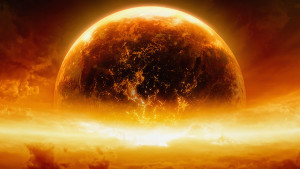Hell is where we, not God, have made it. Eric Webster explains the origins and implications of our misunderstanding.
The topic of hell has never been popular, and it isn't the most pleasant in Scripture. We would all prefer to contemplate heaven and to exult in its attraction and glory, which, after all, is a better way to look at life. Nevertheless, one can neither ignore the fate of those who would reject Christ's call and salvation, nor the punishment of those we might wish consigned there. But what is the biblical truth about hell compared with our mental concept?
Where Is “Hell”?
The word hell, which appears in the New Testament of the King James Version (KJV) of the Bible, is the translation of three Greek words—hades, tartarus and gehenna—transliterated into English solely as hell, but each with a unique meaning in the original.
Hades—used 11 times in the New Testament, and is equivalent to the Old Testament Hebrew, sheol, which means a grave or pit. All humankind, whether they've done good or evil, go to hades (the grave) eventually. This is not a place of burning or torture. It is the resting place of all dead awaiting God's final judgment of their lives, and the resurrection to either eternal life or damnation (see John 5:28, 29).
A typical example of the usage of hades is in Acts 2:27, where in speaking of the death and burial of Christ, Luke wrote: “Because you will not abandon me to the grave [hades], nor will you let your Holy One see decay.” During the time Jesus was in the tomb, He certainly was not in a burning inferno.
Tartarus—translated “hell” in 2 Peter 2:4—is used only once in the entire New Testament. In the KJV it reads: “For if God spared not the angels that sinned, but cast them down to hell [tartarus], and delivered them into chains of darkness, to be reserved unto judgment... .”
This usage of tartarus as “hell” has reference to the fate of fallen angels, not to human beings. The fallen angels are confined to tartarus as a place of detention while awaiting judgment. It isn't a place of torture for even these demonic rebels. As far as humankind is concerned, the wicked at death go to the “hell” of hades—the grave—not tartarus.
Gehenna—comes from the Hebrew Gai Hinnom, or “valley of Hinnom,” a literal place, a valley south-west of Jerusalem, which was the city's cesspool, rubbish dump and body-disposal site. There fires fuelled by refuse and carcasses burned continuously, devouring the obnoxious odours. It's from this literal place that gehenna took on a more metaphorical meaning as a place of everlasting burning.
The word is 12 times rendered as hell from the original Greek New Testament. This hell is a place of burning and refers to the fires of hell that will consume the wicked on earth after the final judgment. It was a most effective and apt metaphor for the concept, especially for the local inhabitants of Jerusalem, who would have had no desire to go there.
Gehenna, at the end of the world, is the lake of fire that finally destroys all trace of sin and sinners forever—but that doesn't mean it burns forever. The apostle John wrote of this time, “Then death and Hades [the grave, which represents it] were thrown into the lake of fire. The lake of fire is the second death” (Revelation 20:14).
Immortality And Its Implication
The widely accepted theological doctrine that the unsaved now already inhabit hell, where they burn continuously, comes from a misconception of the true nature of humankind's state after death.
In the beginning, God said to Adam and Eve, “You must not eat fruit from the tree that is in the middle of the garden, and you must not touch it, or you will die” (Genesis 3:3). However, the serpent, answering Eve's argument, countered, “You will not surely die” (Genesis 3:4).
Obviously the two statements were in conflict. Eve's choice, as is ours, is whether to believe God or believe Satan. Eve chose the latter. As have people ever since, including, unfortunately, those charged with protecting the authenticity and integrity of Scripture.
The idea that at death a human being simply sheds the outer garment of the body and passes to another existence is prevalent in many religions, most recently the New Age movement. Many believe that death is not real; it is simply the gateway to a better, fuller life—or hell, depending on how you've lived.
Through the centuries the idea of an immortal soul gained credence. It reached its height of influence in Grecian philosophy.
Swiss theologian Oscar Cullmann writes, “In Plato's impressive description of the death of Socrates, in the Phaedo, occurs perhaps the highest and most sublime doctrine ever presented on the immortality of the soul.” 1
In his book Immortality of the Soul or Resurrection of the Dead? Cullmann shows that the Greek concept of immortality of the soul eventually displaced the early Christian emphasis on the resurrection and became mainstream theology. Obviously the two are incompatible, for if you believe the former, the second is a redundant absurdity.
South African theologian J J F Durand writes: “There is ... no doubt that the idea of the immortality of the soul is of Greek origin and that it is part of a dualistic view of man: the body is the lower, material part of man and his soul is the higher, spiritual and divine part of it... . This is my fundamental and most important theological objection to the idea of an immortal soul: the idea that there is something in man that survives death and that defies God's curse.” 2
Although Durand takes this position, he does believe that for the believer in Christ, eternal life begins in this life. At death “nothing of my old earthly existence [body and soul] remains at the time of my death. The only thing that remains is the new life that is hid with Christ in God [see Colossians 3 and 4], waiting for the last trumpet. In other words the future of the resurrection is already a present reality and this fact constitutes my continuity.” 3
When Christianity took on the Grecian idea of the soul's immortality, then their concept of death also took on a new meaning. That is, if the soul is immortal and cannot die, then at death we all must live on—the good in heaven, some, perhaps, in purgatory, and the truly wicked, in the hell of gehenna, burning unceasingly.
But, as the Bible teaches, the soul isn't immortal in the sense that we pass directly from one life to the next.
Rather, it teaches that God alone is immortal (1 Timothy 6:16). Jesus says quite clearly that we are to fear the one “who can destroy both soul and body in hell [gehenna]” (Matthew 10:28).
But a gehenna-like fire will rage on earth following the second coming of Christ, and at the end of a thousand years during which Satan is confined to earth, and after the final judgment in heaven overseen by the righteous. (See Revelation 20 for a full description.) John wrote of the time, “Fire came down from heaven and devoured [Satan, his cohorts, and the human wicked]” (Revelation 20:9), speaking of this final destruction.
The Bible says, “the wages of sin is death” (Romans 6:23), not eternal torment by fire. What is eternal, is the separation from Christ. The various Greek words used to describe the punishment of the wicked and their contexts carry this idea of utter, final and eternal destruction.
In this connection Dr Richard F Weymouth, translator of The New Testament in Modern Speech, writes, “My mind fails to conceive a grosser misinterpretation of language than when the five or six strongest words which the Greek tongue possesses, signifying ‘destroy,' or ‘destruction,' are explained to mean maintaining an everlasting but wretched existence. To translate black as white is nothing to this.” 4
Problem Passages
Sometimes the words of Jesus are taken too literally or mix the literal and metaphoric, as in, “If your eye causes you to sin, pluck it out. It is better for you to enter the kingdom of God with one eye than to have two eyes and be thrown into hell [gehenna], where ‘their worm does not die, and the fire is not quenched'” (Mark 9:47, 48). Obviously, a literal interpretation would be misleading and absurd.
His words (verse 48) are quoting Isaiah 66:24 in a description of the final destruction of the wicked. Does this passage mean we also have immortal worms as well as immortal sinners? Or does it simply mean that just as maggots continued to feed off the decaying corpses in the Valley of Gehenna, so with the final fires of hell, no agent of destruction will cease until the fire has accomplished its purpose? The fire that “is not quenched” doesn't mean the fire will never cease—it means that no agent will be able to put it out until its work is done. (For an example of the usage of the word quench in the history of Jerusalem; see Jeremiah 17:27; 52:13.)
In another passage, depicting the final division of “the sheep” and “the goats,” Jesus says, “Then they will go away to eternal punishment, but the righteous to eternal life” (Matthew 25:46). Here again, some detect in this the fires of an eternal hell.
But notice, it is eternal punishment, not eternal punishing. The consequences of the punishment are eternal. The letter of Jude speaks of Sodom and Gomorrah “suffer[ing] the punishment of eternal fire” (verse 7), but Peter (2 Peter 2:6) tells us these cities were turned to ash. The destructive fire didn't have to burn for eternity to have an eternal effect.
The psalmist writes that the final fires of hell will annihilate the wicked: “The wicked will perish: the Lord's enemies will be like the beauty of the fields, they will vanish—vanish like smoke” (Psalm 37:20), a concept the prophet Malachi repeats. “‘The day is coming; it will burn like a furnace. All the arrogant and every evildoer will be stubble, and that day that is coming will set them on fire,' says the Lord Almighty... . ‘The wicked ... will be ashes under the soles of your feet'” (Malachi 4:1, 3).
Hell, In The Bible, In A Nutshell
- No-one is at present suffering in the fires of hell (Gehenna).
- In the Buble the word 'hell' can mean either the literal grave, a place of detention for fallen angels, or the lake of fire of the book of Revelation.
- Humankind does not possess an immortal soul; therefore the wicked will not burn for eternity.
- The wicked will be devoured in a gehenna-like fire at the end of time, after the Second Coming, but after the final judgement and resurrection of the wicked.
- The effect of the fire of hell is eternal and will utterly devour sinners.
- The Fire of gehenna will purfify the world and will give place to God's beautiful new world where sin is no more (Revelation 21:14).
- This strange act of destruction fo Satan and the wicked will yet unfold as a manifestation of the justice and eternal love of God.





